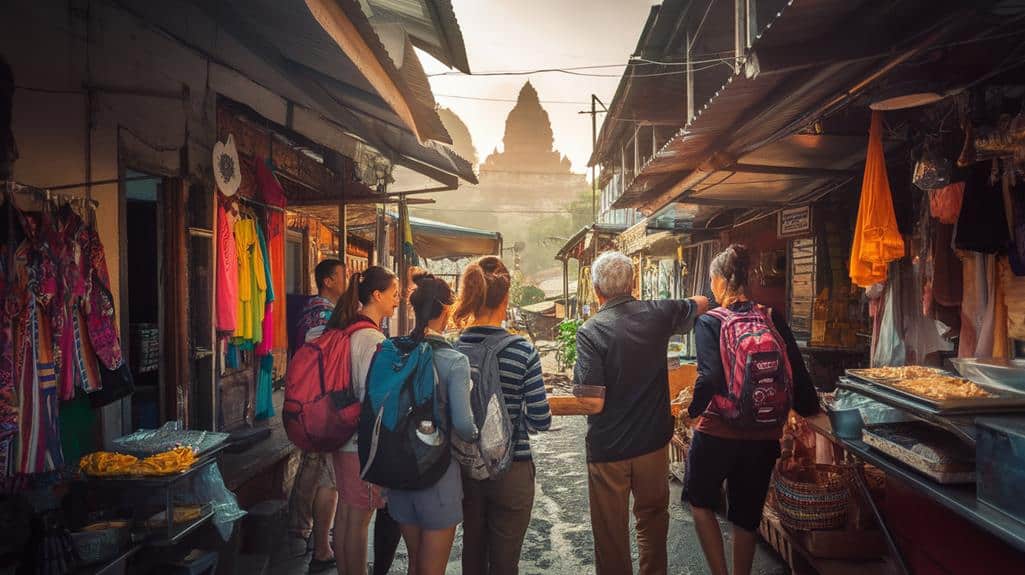
5 Unique Cultural Adventures Beyond the Tourist Trail
Venture beyond the beaten path with these five unique cultural adventures. Immerse yourself in a remote monastery retreat, participating in ancient rituals and simple living. Experience a tribal village homestay, engaging in traditional activities and customs. Learn age-old techniques in an ancient craft workshop, creating tangible links to the past. Join a nomadic desert caravan journey, traversing historic trade routes and mastering survival skills. Explore hidden culinary traditions, uncovering rare ingredients and centuries-old cooking methods. These transformative experiences offer unparalleled insights into diverse cultures, providing a deeper understanding of ancient practices and remote landscapes. Discover how these authentic encounters can reshape your perspective on travel and cultural immersion.
In a Nutshell
- Remote monastery retreat offers immersion in ancient traditions, daily rituals, and spiritual practices away from tourist crowds.
- Tribal village homestay provides authentic cultural exchange through participation in daily activities and traditional customs.
- Ancient craft workshop immersion teaches hands-on traditional techniques using authentic tools, connecting visitors with local artisanal heritage.
- Nomadic desert caravan journey traverses ancient trade routes, teaching survival skills and offering insights into Bedouin culture.
- Hidden culinary traditions discovery explores age-old cooking methods, indigenous ingredients, and cultural significance of local gastronomy.
Remote Monastery Retreat
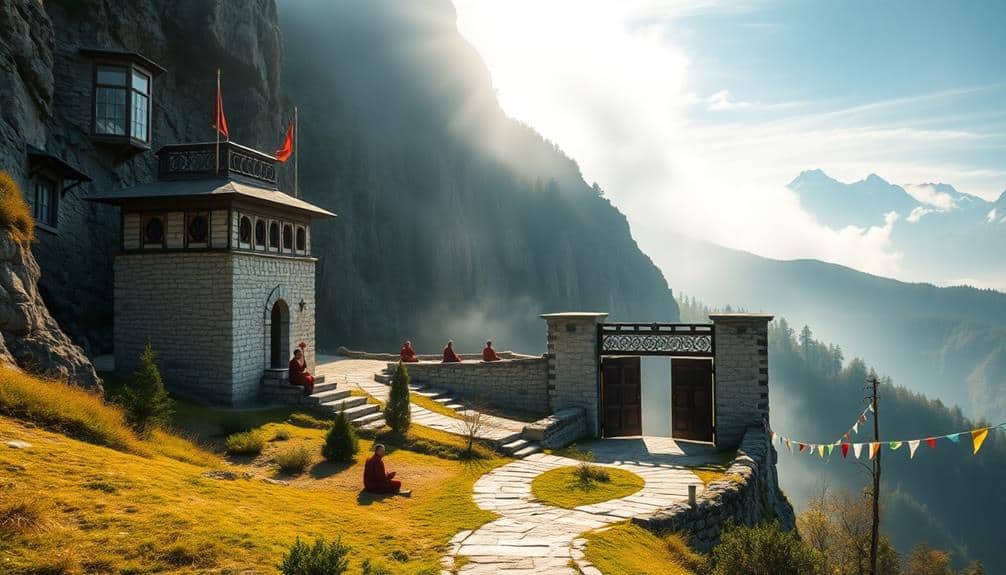
Ever wondered what it's like to escape the hustle of modern life completely? A remote monastery retreat offers just that, immersing you in centuries-old traditions and serene surroundings. These secluded sanctuaries, often nestled in mountainous regions or dense forests, provide a unique opportunity to experience monastic life firsthand. You'll participate in daily rituals, including meditation sessions, chanting, and communal meals prepared with locally sourced ingredients. Many retreats offer simple accommodations, typically sparse cells or dormitories, reflecting the monks' austere lifestyle. When packing for your retreat, consider bringing a portable drying rack to manage laundry in these minimalist settings. These compact racks are ideal for small spaces and can handle heavy garments like robes or towels. Activities may include learning ancient calligraphy, tending to monastery gardens, or engaging in philosophical discussions with resident scholars. While WiFi and modern amenities are usually limited or nonexistent, you'll gain invaluable insights into mindfulness practices and self-reflection techniques. These retreats, lasting anywhere from a weekend to several weeks, offer a profound cultural immersion and spiritual rejuvenation.
Tribal Village Homestay Experience
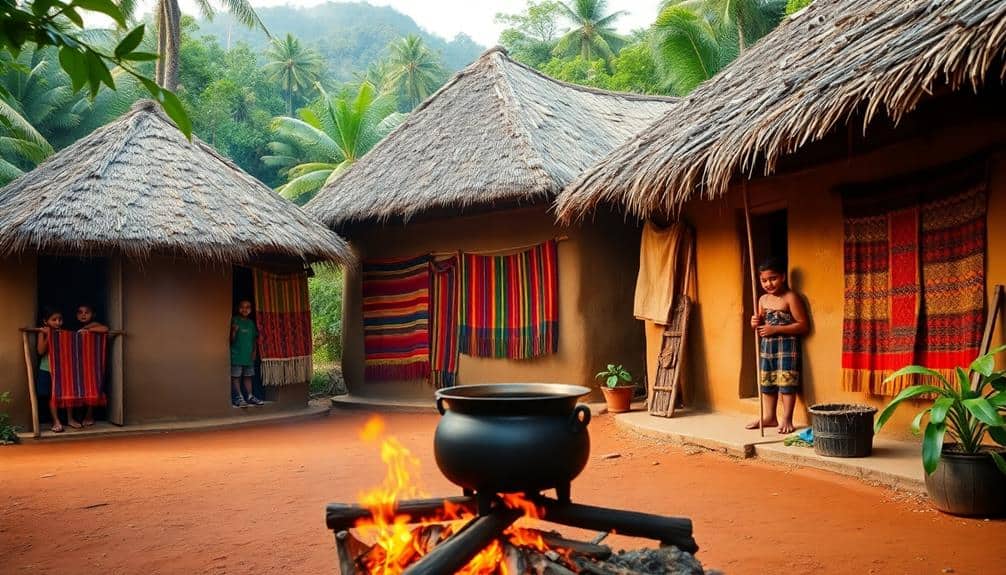
Thatched roofs and wooden huts dot the landscape as you approach a tribal village for your homestay experience. You'll be immersed in a world far removed from modern conveniences, where ancient traditions and customs still govern daily life. Your host family will welcome you into their home, sharing meals, stories, and local knowledge. You'll participate in daily activities, such as tending to crops, weaving textiles, or preparing traditional dishes. This hands-on experience offers unparalleled insights into the community's culture and way of life. Before embarking on this adventure, set out to pack a travel-sized first aid kit to address any minor health concerns during your stay. As night falls, you'll sleep on simple bedding, perhaps a woven mat on the floor, surrounded by the sounds of nature. While basic, these accommodations provide an authentic glimpse into tribal living. Remember to respect local customs, dress modestly, and ask permission before taking photographs to guarantee a mutually rewarding cultural exchange.
Ancient Craft Workshop Immersion
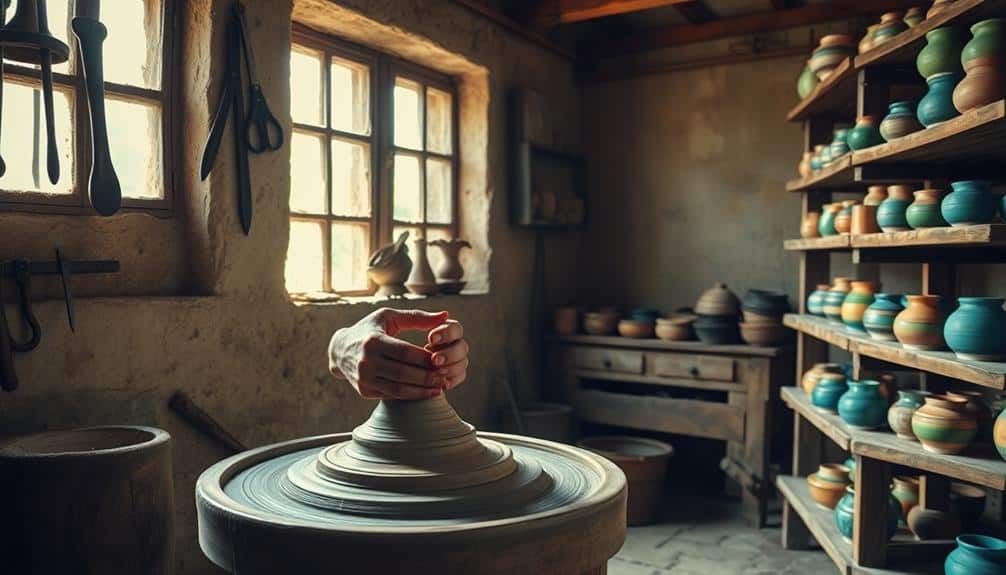
As you step into the dimly lit workshop, the scent of wood shavings and clay fills the air. You're about to commence an immersive experience in ancient craftsmanship, guided by skilled artisans who've inherited generations of knowledge. These workshops, often located in historic districts or rural villages, offer hands-on instruction in traditional techniques such as pottery, weaving, or metalwork. For the adventurous traveler, these experiences can be enhanced by bringing along portable sewing solutions to mend or customize traditional garments worn during the workshops.
You'll learn to use authentic tools and materials, understanding the intricacies of each craft. The process typically involves several stages, from preparing raw materials to finishing touches. Workshops can last anywhere from a few hours to several days, depending on the complexity of the craft. You'll gain insight into the cultural significance of these arts, their historical context, and their role in contemporary society. This experience provides a deeper connection to local traditions and a tangible link to the past.
Nomadic Desert Caravan Journey

The rhythmic swaying of camels and the vast expanse of golden dunes set the stage for an unforgettable nomadic desert caravan journey. You'll traverse ancient trade routes, guided by experienced Bedouin leaders who navigate using traditional celestial methods. During your trek, you'll learn essential desert survival skills, including how to locate water sources and construct temporary shelters using minimal resources. The journey typically spans 7-10 days, covering distances of 15-20 kilometers daily.
Nights are spent in authentic Bedouin camps, where you'll sleep under the stars in traditional goat-hair tents. You'll partake in preparing meals using age-old techniques, such as baking bread in the sand. This immersive experience offers unparalleled insights into nomadic culture, allowing you to witness firsthand the harmonious relationship between humans and the harsh desert environment.
Hidden Culinary Traditions Discovery
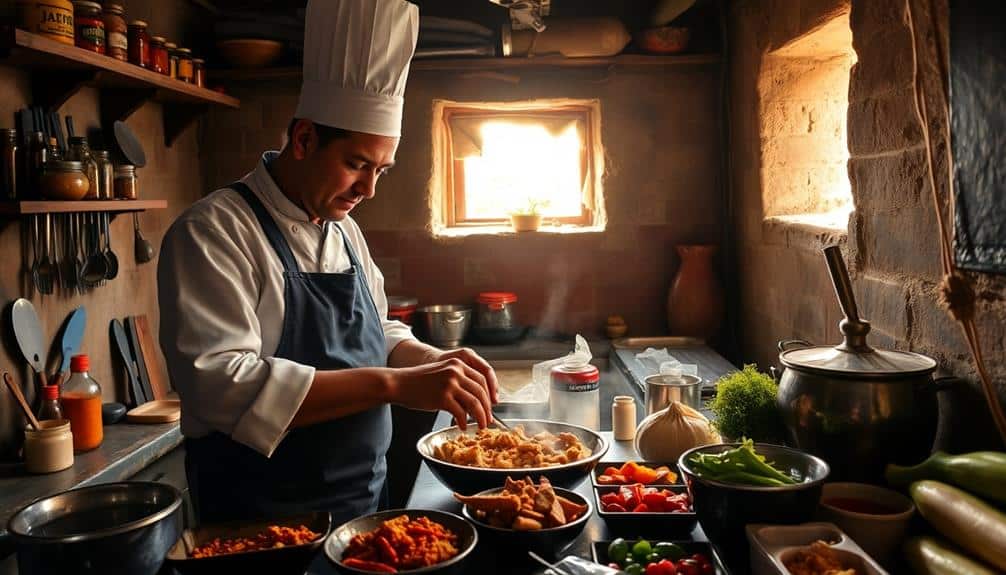
Venturing beyond tourist hotspots, you'll uncover a world of hidden culinary traditions that have been passed down through generations. These gastronomic treasures, often tucked away in remote villages or family-run establishments, offer a genuine taste of local culture. You'll discover age-old cooking techniques, such as underground pit roasting or fermentation methods unique to specific regions. Seek out community feasts, where you can sample dishes prepared using recipes that have remained unchanged for centuries. Participate in foraging expeditions led by local experts to learn about indigenous ingredients and their traditional uses. Don't miss the opportunity to visit local markets, where you'll find rare spices, herbs, and produce that form the backbone of these culinary traditions. By engaging with local cooks and food artisans, you'll gain invaluable insights into the cultural significance of these hidden gastronomic practices.
Frequently Asked Questions
How Do I Prepare Physically and Mentally for These Unique Cultural Adventures?
Like a butterfly emerging from its chrysalis, you must transform your body and mind for these adventures. You'll need to build stamina through regular cardio exercises and strength training. Mentally, practice mindfulness and stress-management techniques. Research the culture you'll encounter, learning basic phrases and customs. Pack appropriate clothing and gear, considering climate and terrain. Consult your doctor about necessary vaccinations and medications. Finally, cultivate an open mind, ready to embrace new experiences and perspectives.
What Vaccinations or Health Precautions Are Recommended for These Off-The-Beaten-Path Experiences?
When preparing for off-the-beaten-path experiences, you'll need to consult your healthcare provider for specific recommendations. Generally, you should confirm your routine vaccinations are up-to-date, including tetanus, diphtheria, and measles. Depending on your destination, you might need additional vaccinations for diseases like hepatitis A, typhoid, or yellow fever. Don't forget to pack a thorough first-aid kit, including any prescription medications you regularly take. Consider travel insurance that covers medical evacuation, especially for remote locations.
Are There Age Restrictions or Fitness Requirements for Participating in These Activities?
Fitness factors and age affect adventure accessibility. You'll find that many off-the-beaten-path experiences have varying requirements. While some activities are suitable for all ages and fitness levels, others may demand robust physical conditioning or impose age restrictions. It's essential to carefully review each activity's specific guidelines, which often include minimum age limits, health prerequisites, and fitness benchmarks. Always consult with tour operators or local guides for detailed information on participation requirements, ensuring you're adequately prepared for the chosen experience.
How Can I Respect Local Customs and Avoid Cultural Faux Pas?
To respect local customs and avoid cultural faux pas, you'll need to research the specific destination's etiquette before your trip. Learn about appropriate dress codes, greetings, and dining customs. Be mindful of religious practices and sacred sites. Observe local behavior and follow suit. Don't assume your usual gestures are universally understood. Ask for permission before taking photos, especially of people. Learn a few basic phrases in the local language to show respect. Always err on the side of modesty and politeness.
What Photography or Recording Equipment Is Allowed During These Cultural Experiences?
Did you know that 77% of travelers take photos during cultural experiences? When it comes to photography equipment, you'll generally find that compact cameras and smartphones are widely accepted. However, for more immersive experiences, such as religious ceremonies or tribal rituals, it's best to ask permission first. Some locations may restrict flash photography or videography. Always be respectful and mindful of local customs, and if in doubt, consult your guide or local authorities for specific guidelines.
